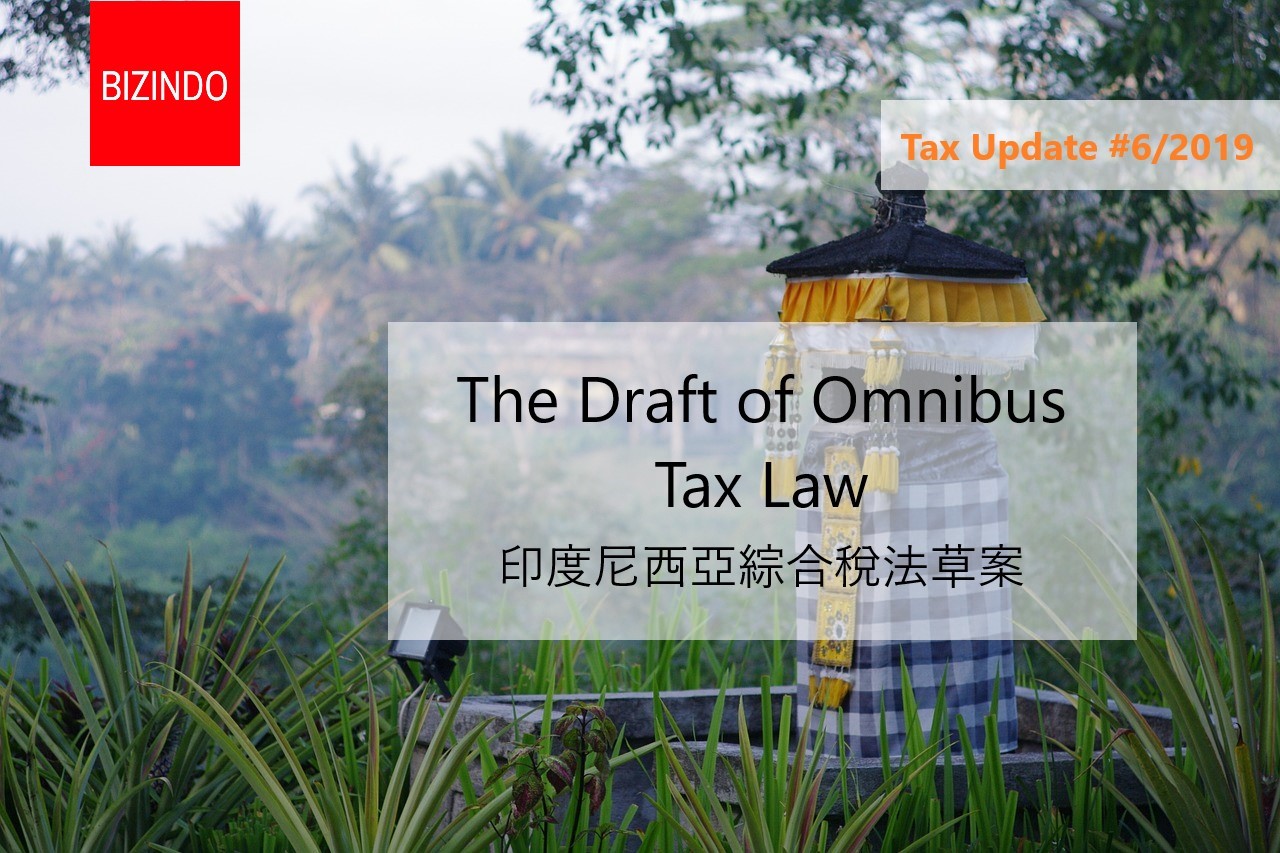The government has recently announced that it will seek to introduce two “Omnibus” Laws. The first (related to tax) will seek to promote investment, voluntary tax compliance, and equality between domestic and foreign businesses. The second is targeting the ease of doing business in
Indonesia and will include an updated positive investment list.
The Omnibus concept involves legislation which, as a single instrument, operates to amend a number of underlying laws. The Omnibus approach is often used to deal with specific legislative issues without the need to seek complete amendments of the relevant underlying law.
In this case the Omnibus Tax Law (entitled “Tax Provisions and Concessions for Economic Consolidation”) is proposing to amend the General Tax Provisions and Procedures Law, the Income Tax Law, the Value Added Tax (VAT) Law, and the Regional Tax and Retribution Law. This Tax Update offers high level discussion points on the draft Omnibus Tax Law based upon a Ministry of Finance Press Release of 25 November 2019.
It is expected that more comprehensive reform of these tax laws will continue via the regular amendment process which has been in train for several years now.
According to the latest public draft the Omnibus Tax Law will seek to implement the following:
- Reduction in Corporate Income Tax (CIT) rate
a. the CIT rate will be gradually reduced from the current rate of 25% to 22% in 2021–2022 and to 20% starting 2023.
b. the CIT rate for companies newly listed on the Indonesia Stock Exchange, that meet certain requirements, would be reduced by a further 3%, for the first five years of listing (i.e. the CIT rate will become 19% in 2021–2022 and 17% starting 2023). - Tax exemption on dividends received by domestic taxpayers
a. Indonesian-sourced dividends received by resident taxpayers will be CIT exempt if reinvested in Indonesia for a certain period (detail still to be specified).
b. Foreign-sourced dividends, or the after-tax profits of a Permanent Establishment, which is earned by resident taxpayers (either listed or non-listed) will also be CIT exempt if reinvested in Indonesia for a certain period (detail still to be specified). - Tax reduction on interest income received by foreign taxpayers
The 20% Article 26 Income Tax withholding currently applying to interest payments due to foreign taxpayers will be reduced where the interest is sourced from Indonesia. There is no guidance as yet on the reduction. - Territorial basis in calculating taxable income of individual taxpayers
a. Indonesian citizens that reside abroad for more than 183 days will be treated as non-resident if they fulfil certain requirements (still to be specified). Withholding on their Indonesian-sourced income will be at the 20% Article 26 Income Tax rate. Non-Indonesian sourced income will be non-taxable while the Indonesian citizen is non-resident.
b. Expatriates with dual tax residency and who reside in Indonesia beyond the 183 days time test will be deemed as resident. However only Indonesian-sourced income will be subject to Indonesian income tax. - Relaxation on creditable Input VAT for VAT-able Entrepreneurs
a. Input VAT incurred on the utilisation of goods/services prior to the VAT-able Entrepreneur being registered will be creditable to a level of 80% of the entrepreneur’s taxable delivery.
b. Input VAT discovered during a tax audit process will be creditable. - New standard rate on administrative sanctions to increase voluntary compliance
a. The tax administrative sanctions will be adjusted to follow a prevailing bank interest rate. This should result in tax administrative sanctions lower than the current 2% per month.
b. The tax administrative sanctions due on the improper issuance of VAT invoices, or for not registering as a VAT-able Entrepreneur, will be reduced to 1% of the tax base. - New standard rate on interest compensation received by taxpayers
The use of the prevailing bank interest rate will also apply to interest compensation paid by the tax authority on incorrect tax assessments. - New approach to tax e-commerce
a. The Omnibus Tax Law will outline a framework for foreign ecommerce or digital business platforms to collect VAT on transactions in the Indonesian market and to report this VAT to the tax authority.
b. The government will separately expand the scope of a “permanent establishment” to include foreign digital players with a significant “economic presence” in Indonesia (i.e. even if without any physical presence). This is with a view to increasing the tax collected on the
Indonesian-sourced income of e-commerce businesses (subject to any tax treaty intervention). - Harmonisation of regional taxes
Regional governments are already authorised to collect regional taxes where the Tax Objects and tax rate thresholds are determined by Parliament through the Regional Tax and Retribution Law. The Omnibus Law will provide authority to the central government to set the rates of these taxes through a Presidential Decree after consultation with the relevant regional governments. Greater regional harmonisation of the tax rates etc. is the apparent goal of this change which is hoped to create a better business environment, spur investment and job creation but still maintain the ability of the regional governments to collect tax revenue. - One-stop source of tax concessions
Indonesia has several tax concessions including:
i) the Tax Holiday;
ii) the Super Deduction on spending for vocational training, research and development in Indonesia, etc.;
iii) for labour-intensive industries;
iv) for Special Economic Zones;
v) for government securities traded in the international market; and
vi) for reductions or exemptions of regional taxes.
These concessions will be summarised into a specific category in the law so as to provide more consistency and a greater legal basis.
In term of progress the current draft of the Omnibus Tax Law was recently presented in a government meeting by the Ministry of Finance. This draft is an update of an earlier draft after input from other ministries and government agencies. The government is planning to submit the final draft to parliament this December. We expect that the Omnibus amendments should generally be viewed positively by taxpayers. For more info, kindly contact us at: [email protected]
Get a Quote to Change Company Financial Year
Kindly fill in the form below, our consultant will get in touch as soonest.
Alternatively you can call at +62 815 629 0000 or email to [email protected]





 20% off today. Whatsapp us!
20% off today. Whatsapp us!